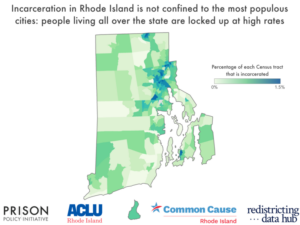Press Release
New data reveals where people in Rhode Island prisons come from
Today Common Cause Rhode Island, the ACLU of Rhode Island, the Redistricting Data Hub, and the Prison Policy Initiative released a new report, Where people in prison come from: The geography of mass incarceration in Rhode Island, that provides an in-depth look at where people incarcerated in Rhode Island state prisons come from. The report also provides 11 detailed data tables — including city ward and neighborhood data for Providence and Cranston — that serve as a foundation for advocates, organizers, policymakers, data journalists, academics, and others to analyze how incarceration relates to other factors of community well-being.
The report shows:
- Many of the cities with the highest incarceration rates also have poverty rates well above the state’s average. For example, Central Falls, with a poverty rate of 25%, and Providence, with a rate of 22%, are both more than twice the statewide poverty rate.
- Every single city and town — and every state legislative district — is missing a portion of its population to incarceration in state prison.
- The state’s largest city, Providence, has both the most people in prison and the highest incarceration rate in the state.
- There are dramatic differences in incarceration rates within communities. For example, in Cranston, the Arlington neighborhood had an incarceration rate of 281 per 100,000 residents, while in the neighborhood of Stone Hill, just a few miles away, no residents were incarcerated.
Data tables included in the report provide residence information for people in Rhode Island state prisons at the time of the 2020 Census, offering the clearest look ever at which communities are most impacted by mass incarceration. They break down the number of people locked up by county, city, town, zip code, legislative district, census tract, and other areas.
“The nation’s 40-year failed experiment with mass incarceration harms each and every one of us. This analysis shows that while some communities are disproportionately impacted by this failed policy, nobody escapes the damage it causes,” said Emily Widra, Senior Research Analyst at the Prison Policy Initiative. “Our report is just the beginning. We’re making this data available so others can further examine how geographic incarceration trends correlate with other problems communities face.”
The data show the cities with the highest state prison incarceration rates are Providence (354 per 100,000 residents), Woonsocket (325 per 100,000 residents), and Central Falls (300 per 100,000 residents). For comparison, Barrington is the town with the lowest prison incarceration rate, at 12 people in state prison per 100,000 residents.

“This report reemphasizes the urgent need for legislative action to correct Rhode Island’s starkly gerrymandered legislative districts. This issue has remained unaddressed for over a decade,” said John Marion, executive director of Common Cause Rhode Island. “It’s far past time that incarcerated people are counted where they live instead of where they happened to be on Census Day.”
The report cites studies that show that incarceration rates correlate with a variety of negative outcomes, including higher rates of asthma, depression, lower standardized test scores, reduced life expectancy, and more. The data included in this report gives researchers the tools they need to better understand how these correlations play out in Rhode Island.
“This report’s documentation of the many ramifications that flow from incarceration — social, educational, and medical — highlights the need for the state to more urgently address the overuse of our prison system and focus more on justice reinvestment initiatives,” said Steve Brown, Executive Director of the ACLU of Rhode Island. “This thorough analysis also provides another reason for legislators to fully address the unacceptable racial and demographic consequences of prison gerrymandering in the state.”
The report is part of a series of reports examining the geography of mass incarceration in America. The report is available at: https://www.prisonpolicy.org/origin/ri/2020/report.html